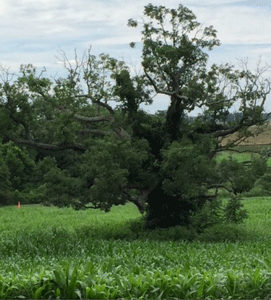Dr. Kerri Moseley-Hobbs recalled the project that began in 2014 with her grandmother Susie Isabell.
“My grandmother didn’t talk a lot,” said Dr. Mosely-Hobbs. “That generation was quiet about their history. But 30 days before she died, she talked to me about researching the family’s history. She began to tell me about family members, gave me names, and talked to me about people she knew.”
She added, “Initially, it was to be a story of facts that would be shared with family members. However, I becameobsessed with the research. I was so fascinated by what I discovered about my family.”
Dr. Moseley-Hobbs’ research, coupled with her son Anthony Michael Hobbs’ suggestion to put it in book form, led her to write the highly acclaimed work, “More Than A Fraction.”
“It took me two years to write the book,” said Dr. Moseley-Hobbs. “The goal of the book is to make those who were enslaved, people instead of props. Some of our favorite movies have the same storyline – that slaves woke up, suffered, and slept. I took the documentation that was available and used it to present them as people.”
The book tells the tale of “Thomas Fraction” and “Othello Fraction” – brothers and best friends who had heard (and let no one forget) that they were descendants of an African nobleman whose tribal scars looked like tiger stripes.
“The characters are based on real people and the events,” said Dr. Moseley-Hobbs.
Considered three-fifths a person, the book tells the story of how the Fraction family came to America, contributed to the Civil War, survived murder attempts on their lives, and eventually settled outside of Blacksburg, Virginia as southern refugees. Dr. Moseley-Hobbs is the third great-granddaughter of Thomas Fraction, who was enslaved at a Blacksburg, Virginia plantation, and later enlisted in the Union Army during the Civil War.
After discovering that the Smithfield Plantation was still in existence, Dr. Moseley-Hobbs went to see the place where so much of her family’s past had taken place.
“I hopped in my car and drove down to Virginia Tech,” she recalled. “It was fascinating. The place was still frozen in time. The tree, where my ancestors had carried out a great deal of merriment, was still there. It was never cut down because of its history.”
She added, “It turned out that Virginia Tech had been looking for the Fraction descendants for years. They wanted to do a better job of telling the story of African Americans in the foundation of their history. God led us to them. For me, it was not anger, but a spiritual homecoming.”
Dr. Mosely-Hobbs’s research told a story of how her family had been transported on a ship called the True Blue to America for a life of enslavement at the Smithfield and Solitude plantations. Historians believe the Fractions had the most family members who lived at the Smithfield, Solitude and Whitethorne plantations on land that is now part of the Virginia Tech campus.
The cabin where her ancestors lived has since been memorialized at Virginia Tech in the form of a three-room, white home near Solitude Mansion. “The Fraction Family Cabin” is a reminder of what the Fractions and other blacks at that time did to help build the university.
Dr. Moseley-Hobbs also discovered documentation, that told the story of Thomas and Othello Fraction’s struggles to be free after the Civil War was won, and how they became landowners.
“The logic behind the name of the book ‘More Than A Fraction’ is that they were considered only a fraction of a man, but they were much more than enslaved individuals,” she said. I discovered amazing stories of those who survived in spite of all they endured.”
She added, “I was somewhat surprised by some of the pushback and politics I encountered by those who thought I was trying to revise history. I was not revising history, but correcting it.”
Dr. Moseley-Hobbs is a policy, regulation, and administration specialist in the field of higher education. She is a former Promotions Assistant and Junior Writer at The Baltimore Times newspaper.
The descendent of Thomas Fraction is also a member of the Smithfield-Preston Foundation’s Board of Trustees that oversees the historic estate where the Smithfield plantation was located.
The talented author and researcher holds a doctorate degree in Education, two master’s degrees, and a bachelor’s degree.
On May 26, 2019, The African American Civil War Museum in Washington, DC hosted a presentation about her book. On August 17, 2019, from 1 p.m. to 3 p.m., she will be at the Eubie Blake National Jazz Institute and Cultural Center on Howard Street discussing her work.
“I am so proud of Kerri,” said her mother Eunice Mosely. “I believe she has the ability to enlighten the world on what a powerful and influential race we are, which will inspire us all as a people to change for the better.”
More Than A Fraction can be purchased at Barnes & Noble and on Amazon.
